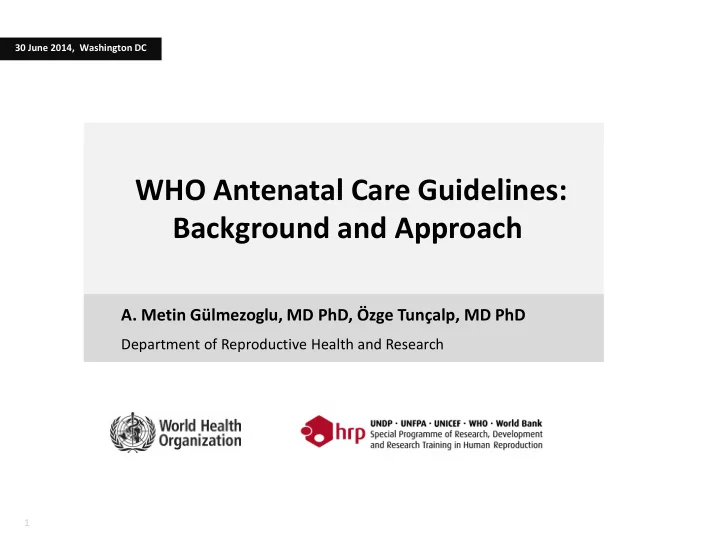

30 June 2014, Washington DC WHO Antenatal Care Guidelines: Background and Approach A. Metin Gülmezoglu, MD PhD, Ӧzge Tunçalp, MD PhD Department of Reproductive Health and Research 1 1
Antenatal Care Continuum of quality care Antenatal period: – Health promotion – Disease prevention – Early detection and treatment for complications – Birth preparedness – Complication readiness 2 2
WHO ANC Model – 1 Specific evidence-based interventions for all women Carried out at four critical times Focused Antenatal Care Model (FANC) 3 3
WHO ANC Model – 2 Two groups of women – Basic component: routine ANC Intended for women who do not have evidence of complications/risk factors. – Special care: Women who need additional assessment/care etc. The assumption: 25% of the women – special care Follow specific guidelines 4 4
WHO ANC Model – 3 Critical times: – 8-12 weeks – 24-26 weeks – 32 weeks – 36-38 weeks Goals and activities: – History – Examination – Screening and tests – Treatments – Preventive measures – Health promotion/counselling 5 5
WHO ANC Model – 4 Rwanda Afghanistan Kenya Djibouti Mozambique Egypt Madagascar Iraq Ethiopia Morocco Uganda Pakistan Thailand Somalia Philippines Sudan Cambodia Yemen China Armenia Papua New Guinea Kyrgyzstan 6 6
WHO ANC Model – 5 Updated Cochrane review and secondary analysis of the WHO trial suggest fewer visits may be associated with increased fetal death Actual content of and the demand for antenatal care is at best variable in different settings DHS analysis (41 countries): Quality – coverage gaps for recommended elements of care for most countries, with the exception of BP measurement Hodgins S, D’Agostino A. The quality-coverage gap in antenatal care: toward better measurement of effective coverage. Glob Health Sci Pract. First published online April 8, 2014. 7 7
New WHO ANC Guidelines To capture and examine the complex nature of the issues surrounding the ANC period within the context of health systems and continuum of care Technical Working Group – Work as part of "Adding content to contact (ACC)" • barriers to antenatal care and implications for care delivery, experiences with implementation of care • integration of antenatal care with other health services (HIV, malaria, syphilis programs, etc) – Technical Working Group Meeting (22-23 April) 8 8
Purpose of ANC Individual versus public health imperatives – Why women attend / do not attend ANC? – ANC as means of reducing adverse outcomes Overarching Questions What are the evidence-based practices during ANC period for improving outcomes? How should these practices be delivered to improve outcomes? 9 9
Focus Essential core package of ANC that all women should receive With the flexibility to employ different options based on the context of the individual country • What is the content of the model/package? • Who provides care? • Where is the care provided? • How is the care provided to meet the needs of the users? 10 10
Work Streams Individual Interventions Antenatal testing Barriers and facilitators to access to and provision of care Large-scale programme evaluation Health system and community level interventions Modeling 11 11
Approach – 1 DECIDE Framework – D eveloping and E valuating C ommunication strategies to support I nformed D ecisions and practice based on E vidence – 5 year EU project that aims to support evidence based decision making – To help decision makers consider a range of relevant criteria when making decisions, including: Resource use Benefits + harms Equity Feasibility Acceptability 12 12
Approach – 2 Work Streams Methodology 1 Individual • Effectiveness reviews Interventions • Systematic reviews • Diagnostic accuracy • Economic Evaluations GRADE – tool to assess certainty 2 Antenatal Testing of evidence on effect 13 13
Approach – 3 Work Streams Methodology 3 Barriers and facilitators to • Meta-synthesis of access to and provision of qualitative studies care • Women • Providers CERQual – newly developed tool to assess confidence in findings across qualitative studies 14 14 Filename
Approach – 4 Work Streams Methodology 4 Programmes • Analysis of selected large-scale country ANC programmes • Contextual and health system factors affecting the implementation • Mixed methods SURE Framework: factors affecting the implementation of health interventions 15 15
Approach – 5 Work Streams Methodology 5 Health system level • Interventions to improve access interventions to and provision of ANC services o Reorganization of health services (i.e., integration) o Financial incentives o Health worker focused interventions • Systematic reviews 16 16 Filename
Approach – 6 Work Streams Methodology 6 Modeling • Systems dynamics simulation model • Inform and facilitate the recommendations related to the models of antenatal care in terms of optimization of the set of practices and the timing of delivery of these services. • Provide flexibility to incorporate contextual factors 17 17
Different Dimensions – What and How • Health HOW system/community level interventions • Programmes HOW • Barriers/Facilitators • Qualitative WHAT • Tests • Interventions MODELING 18 18
Critical Outcomes MATERNAL Infections Anemia Preeclampsia/Eclampsia MATERNAL Gestational DM Morbidity and Mortality Hypothyroidism FETAL/NEONATAL FETAL/NEONATAL Morbidity and Mortality Neonatal Infections Small for gestational age • Clinical end-points Preterm birth Low birth weight Congenital anomalies • Lack of women-centred outcomes 19 19
Health determinants (Biological, social, economic and environmental factors) Health system Health system level interventions to improve delivery of and access to ANC care Healthcare during pregnancy ANC Additional Care CORE CLINICAL PACKAGE Women’s expectations and perceived quality of care Delivery of Antenatal Care Provision of timely, effective, safe health services within a Utilization of services women-centred approach Improved outcomes Clinical outcomes Women-centred outcomes Utilization outcomes 20 20
Thank you! WHO ANC Technical Working Group: Edgardo Abalos, USAID Rifat Atun, Adding Content to Contact Project Chompilas Chongsomchai, Maternal Health Task Force, Harvard School of – Virginia Diaz, Public Health Soo Downe, Integrare ICS – Kenny Finlayson, Claire Glenton, Ipek Gurol-Urganci, Sonja Henderson, Frances Kellie, Khalid Khan, Simon Lewin, Pisake Lumbiganon, Ewelina Rogozinska, Inger Scheel, Marita Sporstol, Matthews Mathai, Ӧzge Tunçalp, A. Metin Gülmezoglu 21 21
Recommend
More recommend